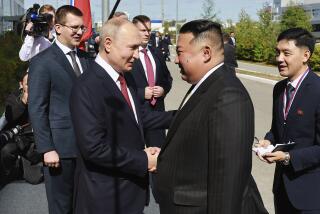‘Big Stride’ Taken Toward Arms Pact, Gorbachev Says
- Share via
MOSCOW — Kremlin leader Mikhail S. Gorbachev, sounding a conciliatory note just after Moscow played its latest card in the war of diplomatic expulsions, today said the United States and Soviet Union moved toward the “possibility of coming to an agreement on nuclear disarmament” during the Iceland summit.
Appearing on television 90 minutes after his Foreign Ministry expelled five more U.S. diplomats and pulled 260 Soviet employees from U.S. jobs in Moscow and Leningrad, Gorbachev told the Soviet public that the summit also clearly defined the many obstacles to arms control.
Speaking on national television for the second time since the summit with President Reagan, Gorbachev said the Oct. 11-12 meetings in Reykjavik encouraged the Soviet leadership on the possibility of reducing nuclear arms.
‘A Big Stride’
“It was perhaps the first time in many decades that such a big stride was made in the quest for nuclear disarmament,” the Communist Party general secretary said.
“I still consider that as a result of the meeting, we achieved a higher stage not only in analyzing the situation, but in defining the aims and framework of possible agreements, agreements on nuclear disarmament,” he said.
However, Gorbachev said the summit “also threw into bold relief the difficulties on the way to a nuclear-free world,” adding that “circles associated with militarism” were frightened by the progress made in Reykjavik.
Tentative Agreements
In Iceland, the superpowers reached tentative agreement on making huge cutbacks in their nuclear arsenals. But the agreement foundered over Reagan’s proposed Strategic Defense Initiative.
Gorbachev reiterated Soviet opposition to the space-based missile defense program, popularly called “Star Wars,” saying it would spur a new arms race and “destabilize the world.”
He said the Soviet Union viewed the summit in Iceland as an important political event and was still analyzing it. He said Washington and Moscow have moved into a new sphere in arms control--to a point to “break the camel’s back on arms control.”
More to Read
Sign up for Essential California
The most important California stories and recommendations in your inbox every morning.
You may occasionally receive promotional content from the Los Angeles Times.













